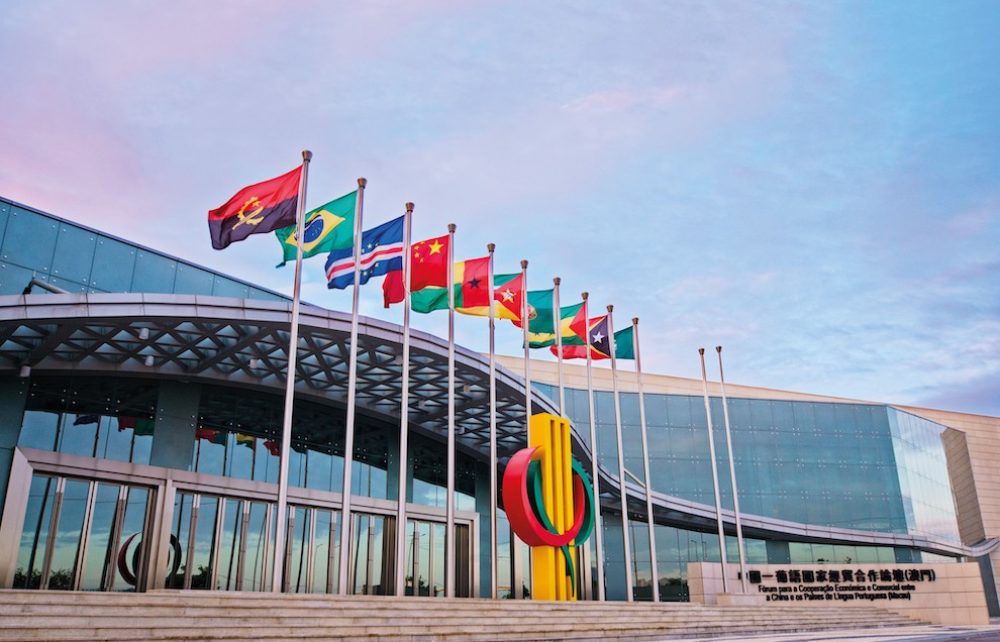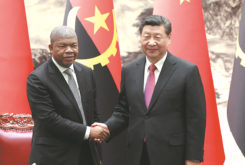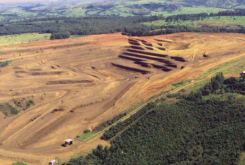*José Luís Sales Marques and Hayan Zhang
After the official launching of the Community of Portuguese Language Countries (CPLP) or the so-called Lusophone Commonwealth in 1996, the Chinese government initiated the “Forum for Economic and Trade Co-operation between China and Portuguese-speaking Countries” in Macau in 2003, also known as Macau Forum. Having recognised the importance of Lusophone Commonwealth, the Forum has become a distinctive component of Chinese foreign policy and Chinese multilateral cooperation programs in promoting China’s trade and FDI relationship with the Portuguese Speaking Countries (PSCs) (Hewitt, Burges, & Gomes, 2017; Mendes, 2014).
The rising trade and FDI flows between China and PSCs in the past decades has drawn interests of a number of scholars to analyse and assess the importance and impact of PSCs and the contribution of Macau Forum from different perspectives, such as PSCs in China’s foreign policy in general and in its African policy in particular (Alden & Alves, 2016; Alves & Saldanha, 2007), PSCs in China’s Belt and Road initiatives (Marques, 2020), globalisation of Chinese enterprises in SPCs (Ihéu and Pereira 2012), China’s economic links with PSCs (Alves, 2008), impact of China on the industrialisation and development of PSCs (Wolf and Cheng 2018, Megbowon, Mlambo et al. 2019), impact of Chinese OFDI on the institutional quality of African PSCs (Pan, Wei et al. 2020), role of Macau in China’s relation with PSCs (Matias, 2009; Mendes, 2014; Mendes et al., 2011), etc. This study will emphasize the institutional setting, impact, mechanism and effectiveness of this institutional framework on China’s outward FDI in PSCs.
Macau Forum in promoting FDI
Institutional setting: Macau Forum consists of a set of institutional arrangements at different levels to ensure the initiation, designing and execution of a multilateral and multi-dimensional program for economic and trade cooperation among China and PSCs. The ministerial conference is the highest decision-making power of the Forum, providing strategic orientation of the Forum and carrying out an agenda-led action plan during the meeting with measurable targets for the next three years. A permanent secretariat was established in Macau to support the execution of the action plans. Several working groups were created to deal with different areas of cooperation, such as promotion of foreign direct investment, development of production capacity, trade, etc.
Agenda-setting Mechanisms: Bilateral and multilateral meetings between government departments of participating countries have been frequently organised to prepare the action plans and cooperation agenda for the Forum. The scope and scale of the cooperation between participating countries have been gradually extended from 7 priority fields announced by the First Ministerial Conference to the 18 agreed in the Fifth Ministerial Conference. During last few years, the cooperation among the forum countries has been concentrated in the public health area to deal with Covid-19 pandemic.
Tools and instruments: The Forum created a multilateral cooperation platform with three trade and business centres to reach its objectives, namely Food Products Exhibition Centre for PSCs, Convention and Exhibition centre for Economic and Trade Co-operation between China and PSCs, and Business Service Centre for SMEs of China and PSCs. These instruments have been used to spread information on investment and business opportunities, to promote reciprocal business visits, to organise exhibitions, fairs and business matchmaking meetings and to provide information and financial supports to trade and investment activities for participating countries of the Forum. A number of online and offline tools and instruments have been successively added to the cooperation platform, while the Complex of Commerce and Trade Co-operation Platform for China and PSCs was inaugurated in Macau in 2019.
Promotion of FDI
Since its establishment, the Forum has focused on the cooperation between participating countries in the area of foreign direct investment. It established an investment working group with representatives of Investment Promotion Department of MOFCOM, Investment Promotion Agencies (IPAs) of PSCs and Macau Trade and Investment Promotion Institute and initiated a number of measures to coordinate FDI policy and improve FDI regulatory environment in PSCs.
Macau forum has supported FDI policy coherence and coordination among participating countries through high level meetings and seminars on FDI promotion and coordination. These policy meetings have determined the mode of cooperation and priority areas for FDI projects. The Forum has also recognized the importance of improving the investment climate in the participating countries, and has committed to strengthen the sharing of the current investment laws and regulations, and to encourage the negotiation and signing of BITs, as well as double taxation avoidance, tax evasion prevention agreements and other bilateral agreements.
The Forum has a set of online and offline infrastructure and services to support central and local governments of participating countries and their companies in sharing information and creating business opportunities. More particularly, the Forum has facilitated FDI promotion activities of participating countries by organising trade and investment fairs, networking and matchmaking events, seminars and training programs for IPAs, etc.
The Forum also initiated an investment fund in 2013, i.e. CPDFund, which was officially inaugurated in Macau in 2017. This US$1 billion funding was financed by China Development Bank (60%) and Macao Industrial and Commercial Development Fund (40%). Yet, because of the restrictive funding conditions, it could not meet the needs of SMEs. Only less than 10 projects were funded since its creation, and mostly concentrated in infrastructure, agriculture and renewable energy sectors.
China’s FDI in PSCs
Since the establishment of Macau Forum, the trade between China and PSCs grew from $11 billion in 2003 to $150 billion in 2019, while China’s outward FDI stock in these countries increased from $64 million to $9.9 billion during the same period. More than 90% of China’s OFDI stock in PSCs is located in three resource intensive countries, namely Brazil, Angola and Mozambique. More than three quarters of China’s greenfield FDI was concentrated in transport equipment, construction, energy, ICT & electronics and financial services.
Conclusion
Macau Forum can be regarded as a complementary platform for China’s bilateral and multilateral cooperation. As compared to the traditional bilateral and multilateral agreement in promoting and coordinating FDI policy and activities of MNEs, Macau Forum has several specific features. First, although the Forum is primarily a business-oriented cooperation platform, it provides a set of much more comprehensive and multifaced programs to create an ecosystem in facilitating business cooperation. The cultural exchange programs of the Forum are aimed to enhance the mutual understanding among PSCs, while the HR training program and technical assistance have allowed to build capabilities for the government and industry in general and to enhance the effectiveness of investment promotion agencies (IPAs) in particular. Second, given the varieties of interests of participating countries, the FDI promotion and coordination activities among PSCs in the context of Macau Forum have been often driven by initiatives at bilateral rather than at multilateral level. They are often unilateral and China-led to complete bilateral cooperation between China and PSCs, rather than multilateral and horizontal/networking cooperation among PSCs. Therefore, more efforts are needed to create more interaction among participating countries, maybe within a multilateral and institutional agreement between CPLC and China. Third, CPDFund has been often evaluated as insufficient due to its required conditions, especially in terms of investment scale (SASS, 2019). Therefore, it was emphasized that the CPDFund needs to be restructured in order to effectively play the investment guidance and promotion function and to increase its visibility in supporting enterprises, especially SMEs, from participating countries. Fourth, as compared to other China-led regional forum, Macau Forum has a more formal institutional setting, higher resource commitment and more effective tools thanks to the contribution of Macau in connecting China to PSCs.
BIO: José Luis Sales de Marques is President of the Board of Directors of the Institute of European Studies of Macau (IEEM) since 1st January 2002. He served as president of the Macau Municipal Council between 1993-2001. Sales Marques holds a degree in Economics awarded by the University of Porto (Portugal), and a Master degree in European Studies by University of Macau with a thesis on China-EU relations. Mr. Marques is also teaching at post-graduate programs in Macau and Europe dedicated to international politics, economic development and urban issues. He is in charge of the course on EU-Asia Relations of the Master of Social Sciences in European Studies (MSSEUS) offered by IEEM/University of Macau. His research, teaching and writings covers international politics, urban issues, history and economic development. His current research is focus on multilateralism, Macau’s external relations, the Greater Bay Area, and China relations with Portuguese speaking countries. He is co-author with Carmen Mendes et al. of “Assessing One Country, Two Systems Formula: The role of Macau in China’s relations with the Portuguese Speaking Countries” (CES, 2011) and contributing author to F. Ilhéu, F. Leandro and P. Duarte, (Eds.) “The New Silk Road and the Portuguese Speaking Countries in the New World Context” (IIM,2019), with the chapter “China and the European Union in the development of the Portuguese Speaking Countries in Africa: Complementarity or competition?”.
Haiyan Zhang is a professor at Department of Strategy and Entrepreneurship of Neoma Business School and guest professor at Institute of European Studies of Macau. He holds a MA and a Ph.D. in public administration and Management from the University of Antwerp. His research interests include international business activities of Chinese and overseas Chinese owned enterprises, management issues of international joint ventures in transition economies, high-tech industrial agglomeration in China, Chinese outward FDI in Europe, EU-China FDI relations, etc. He has consulted for trade associations, government institutions and multinational companies on various topics, such as US direct investment in Belgium, strategic management of bilateral cooperation with Chinese local authorities, merger and acquisition in China, etc. He has often participated in high level debates about EU-China investment relationship at EU institutions and think tank organizations.




